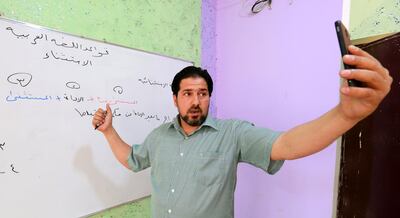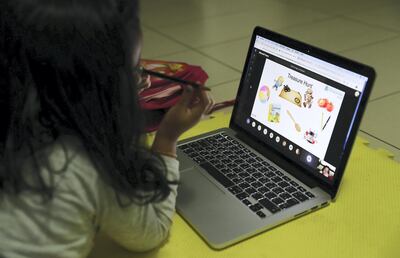While it is too early to say what the final impact of the coronavirus pandemic will be, the crisis has changed almost everything in the short term: international borders have closed, countries have locked down, the global economy has been hit and entire industries have been asked to rethink the way they operate, including the education sector.
It was only at the beginning of last month that the UAE's schools went on early spring break. Schools were asked to provide an initial two weeks of distance learning once the holidays ended and at the end of that trial period, the Ministry of Education announced that classes would continue to be delivered remotely until the end of the academic year.
It is an interesting and challenging moment for schoolchildren, parents and teachers.
For pupils, the change is arguably the greatest, with this period of isolation and physical distancing likely to be the milestone moment of their childhood and development.
A very wide line in the sand has now been drawn in all young people's lives between how things used to be and how they are now: proms have been cancelled, transition days have been postponed and while some exams will still take place, they will not be sat under normal conditions. Students may even be apprehensive about going back into the classroom when this is all over.
Teachers have also had to make many changes. They are now being challenged in ways that they would not have thought possible a few months ago, as all the rhythms of the school day have been disrupted, which is why it is good to see schools singing the national anthem via videoconferencing and hosting virtual assemblies and ceremonies.
Parents are being asked to support their children's learning while also adapting to working from home themselves and, in some cases, dealing with loss or reduction of income. The example set by at least one UAE school group to provide virtual counselling for parents is a good one, because this is an unprecedented moment of anxiety in many households and also because this initiative recognises the need to adapt to challenging times and to work together.

But it is also not surprising that the drums of discontent began beating over fee payments for private schools soon after it was announced that distance learning was to continue until the end of the summer term.
Many parents feel that the fundamentals of their contract with schools have radically changed over the past month, quite apart from possible reductions in family incomes, which is why there has been pushback where administrators say they will not reduce fees or have only made small concessions. The reality is that schools currently provide a different service to the one that they offered at the start of the academic year.
Schools will rightly say that most of their income is used to pay fixed costs, such as teacher salaries, making it hard to offer deep discounts or any at all. But other running costs will inevitably reduce during this period of distance learning.
Some schools also operate at a surplus in normal years, which is either distributed to shareholders through dividends or ploughed back into the school itself. In such extraordinary times, that surplus could be used to alleviate the burdens felt by the broader school community.
Thankfully, many schools have now extended discounts or offered payment plans and other forms of financial relief.
In Abu Dhabi, a fund has also been established by the Authority of Social Contribution – Ma'an – with the support of the Department of Education and Knowledge, to which parents can apply for aid to help pay school fees or for the purchase of technology to support distance learning. A similar scheme is operating in Dubai.
Sadly, other less benevolent examples of parent-school interaction have also emerged.

In the UAE, one major school operator has said that it will "means test" parents who say they are unable to pay fees. In the UK, it has been reported that one private school has told parents it will withhold predicted grades for students seeking university places unless fees are paid on time.
These examples and many more illustrate the ways in which the relationship between schools, parents and children has been comprehensively rewired at seemingly lightning speed.
Once better days return, parents will look at the school their children attend and ask themselves a series of questions: did that school handle this period of distance learning well? Was the school concerned with student wellbeing? Was the school transparent in its dealings over possible fee reductions? Did it come up with smart solutions to new problems?
There is no doubt that when this is all over, many of us will re-evaluate large parts of our lives, not just schooling, but where and how we live and what communities we value. If there is a negative answer to any of those questions above, you will find a lot of movement between schools as parents seek a better deal for their children and for themselves. The natural balance of things has been shifted by the Covid-19 crisis and it is unlikely to snap neatly back into place.
On the other hand, schools that innovate, are responsive to student needs and foster a heightened sense of community, will emerge stronger than ever from these troubled times. As in every crisis, there is an opportunity to be grasped, but to do so it requires us to reach out rather than look inwards.
Nick March is an assistant editor-in-chief at The National

